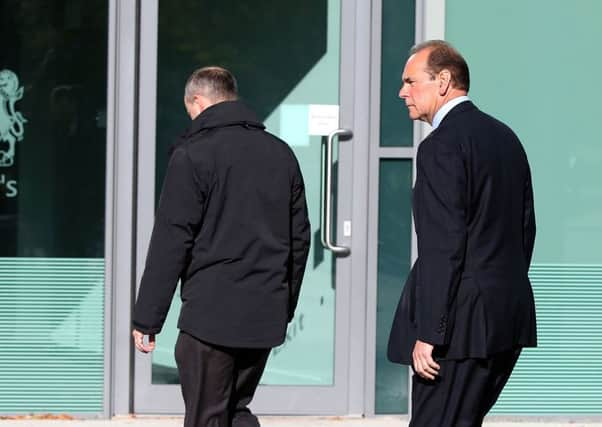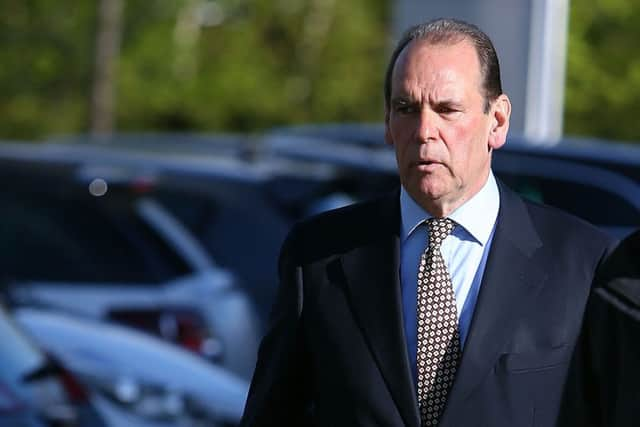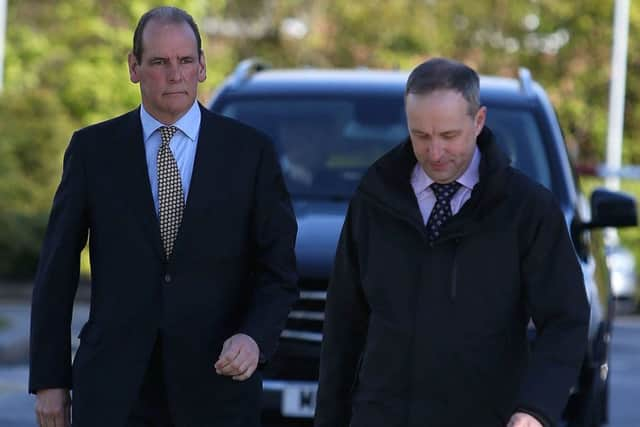Ex-police chief Norman Bettison: My ‘regret’ at Liverpool fans’ slur


He told an inquest jury that the statement he put out the day after the Hillsborough Independent Panel (HIP) report was published on September 12, 2012, claiming fans’ behaviour made the job of police harder, was “hurried” and “ill-thought out”.
Sir Norman, who was a chief inspector with South Yorkshire Police at the time of the 1989 tragedy, was West Yorkshire Police chief constable when the HIP report was published into the deaths of 96 Liverpool fans.
Advertisement
Hide AdAdvertisement
Hide AdHe told an inquest hearing in Warrington today: “I had been personally named as someone at the centre of the police cover-up. That was not a feature of the Hillsborough Independent Panel report but it was a feature of the commentary that followed.”


Sir Norman said that his strategy prior to the report coming out “was to make no comment whatsoever” but that it became apparent he had become “front and centre of the very serious allegations of cover-up and putting blame on the Liverpool fans for causing the death of 96 innocent people”.
He said: “I made a judgement that I needed to respond to that. The communication that I put out was hurried, it was ill-thought out, and it was wrong at the time.”
The statement issued on September 13, 2012 the disaster “was caused mainly through a lack of police control”.
Advertisement
Hide AdAdvertisement
Hide AdIt added: “Fans’ behaviour to the extent that it was relevant at all, made the job of the police in the crush outside Leppings Lane turnstiles, harder than it needed to be.


“It did not cause the disaster any more than the sunny day that encouraged people to linger outside the stadium as the kick-off approached.”
Sir Norman said today that the statement was a “summary of my honestly-held beliefs”, but added: “Even if it was honestly held to be true and even if it was consistent with what I have always said, there is a time and a place and communication needs to be not simply the message provided but how the message is received.
“I regret putting out that statement on the 13th in the terms that I did and on the day that I did.”
Advertisement
Hide AdAdvertisement
Hide AdJonathan Hough QC, counsel to the inquests, asked him: “Which aspect did you subsequently reflect upon as being unwise or inopportune in the circumstances?”
He replied: “The current blame in 2012 was that I was central to a long-standing strategy of blaming Liverpool fans for the deaths of 96 innocent people. I took the view that I ought to respond to that.
“The thing I regret is that I didn’t need to mention that at the time I did.
Mr Hough asked: “You didn’t need to mention fans’ behaviour?” He replied: “At all.”
Advertisement
Hide AdAdvertisement
Hide AdThe following day, the inquests heard, he issued a statement saying: “Let me speak very clearly, the fans of Liverpool FC were in no way to blame for the disaster that unfolded at Hillsborough on April 15, 1989.”
Mr Hough asked if there had been hostile press in the intervening period and he replied: “I am fighting the temptation to smile, it had been a firestorm. There had been camera crews and journalists camping outside my house for 48 hours.”
The witness was also questioned about his role for the South Yorkshire force in the aftermath of the disaster.
Sir Norman maintained he made no “significant” contribution to the management or leadership of the South Yorkshire force’s response to the tragedy in the run-up to holding the original inquests in 1990.
Advertisement
Hide AdAdvertisement
Hide AdSir Norman said: “I thought what I was doing was putting forward evidence to lawyers that would enable them to put forward the case of the chief constable.”
Mr Hough said: “The case would be whatever the senior officers and lawyers determined it should be?”
Sir Norman replied: “Exactly.”
Earlier, he denied being at a meeting of police officers, two days after the disaster, who were told the force was going to blame “drunken, ticketless” Liverpool fans for the tragedy at the 1989 FA Cup semi-final.
He has also denied telling two men in separate pub conversations that he was part of a South Yorkshire Police internal team seeking to blame “drunken” Liverpool supporters for the Hillsborough tragedy.
Advertisement
Hide AdAdvertisement
Hide AdThe court also heard that Oxford-educated Sir Norman, who rose through the ranks from chief inspector to assistant chief constable in three years, had not mentioned his duties in relation to the Hillsborough disaster when he later applied for the top job at the Merseyside force.
The jury was shown his original application for the job.
Mr Hough continued: “In the course of this form, you did not mention, I think, your work within South Yorkshire Police in relation to Hillsborough?”
Sir Norman said: “Because there was not the opportunity to.
“Two reasons - even though I was applying to Merseyside, it was irrelevant in a job application sense, and the second thing is there was no opportunity on either the form or the interview to address it.”
Mr Hough then asked the witness: “Sir Norman, as an intelligent man, did it not occur to you at the time that any work you had done in connection with Hillsborough might be seen in Merseyside as significant?”
Advertisement
Hide AdAdvertisement
Hide AdSir Norman replied: “No,” adding that at the time of his application he had not been criticised by anyone in relation to Hillsborough, and he had “definitely not” intentionally played down his role.
The inquest heard that Sir Norman was given responsibility for pulling together the self-taken statements from police officers on duty and later writing a section of South Yorkshire Police’s submission about the disaster which went to the force’s lawyers for use during the Taylor Inquiry.
During the inquiry itself, which started in May 1989, he attended the hearings every day in his role as the liaison between South Yorkshire Police and the force’s legal team. He also gave updates to the force’s senior officers on the progress of the inquiry.
At one point he wrote a note which was circulated to officers describing the media coverage of the inquiry as “sensationalist” and not representing all the evidence.
Advertisement
Hide AdAdvertisement
Hide AdThe jury was told that in October 1989, after Sir Norman had been promoted to chief superintendent and moved to a role in the traffic division, he attended a meeting at the headquarters of South Yorkshire Police Federation.
He told the hearing that he gave a presentation at the meeting, which was ordered so the chief constable could “address the troops” as the force was “on its knees in many respects” after the publication of the Taylor Inquiry report in August.
Sir Norman was shown minutes of the meeting describing the crowd at the match being “like cling-film around the horses” and being “massively uncooperative”.
He said it was hard to tell which comments were his and which by other people and said he could not recall describing supporters as being “massively uncooperative”.
Advertisement
Hide AdAdvertisement
Hide AdMr Hough said that in the afternoon officers on duty on April 15 gave accounts of their experiences, including some which made “derogatory comments about fans”.
Sir Norman said the officers’ accounts “felt like catharsis” and added: “It seemed to me that it allowed people to get something off their chests.”
Mr Hough asked whether these comments were an attempt to provide Conservative MP Michael Shersby, who was at the meeting, with “material to advance any political position in Parliament”. Sir Norman replied: “No.”
Sir Norman went to Parliament the following month, the jury heard, to provide a video presentation about Hillsborough to an audience of MPs.
Advertisement
Hide AdAdvertisement
Hide AdIn a note written to the chief constable at the time, he said that at least two Conservative MPs had “expressed disappointment” that a Parliamentary debate on the Taylor report was not more imminent.
It said “They believe the passage of time will diminish the impact of their ‘promised’ attack upon the findings of the interim report.”
During Sir Norman’s evidence today, he twice was pulled up by the coroner, Sir John Goldring over the responses he was giving to questions. On the second occasion, the coroner said: “Sir Norman, forgive me, just listen to the question, answer it and don’t volunteer comment.”
The start of today’s evidence was delayed by 20 minutes after the jury was told one of the leading lawyers representing families of victims had suffered a bereavement.
Advertisement
Hide AdAdvertisement
Hide AdSir John Goldring, coroner to the Hillsborough inquests, told the court: “It will become apparent why we are starting a little late today.
“The reason is that Mr Mansfield, who is going to lead in the questioning of Sir Norman, has suffered a bereavement and obviously can’t be here.”